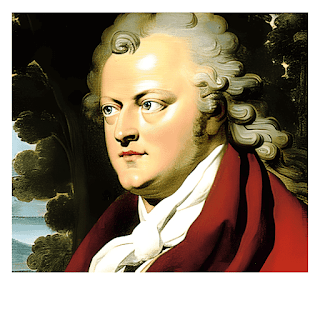William Blake as a Romantic Poet: A Profound Exploration
Introduction
Welcome to our comprehensive exploration of the remarkable poet William Blake, an influential figure in the Romantic literary movement. In this article, we delve deep into the life, works, and poetic genius of William Blake, shedding light on his unique perspective and his profound impact on the world of poetry. Prepare to be captivated by the exquisite verses and visionary insights of this extraordinary poet.
Early Life and Influences
Born on November 28, 1757, in London, William Blake lived during a time of great social and political transformation. His upbringing in a humble family and his exposure to the bustling cityscape of London played a significant role in shaping his artistic sensibilities.
Blake's early encounters with the marvels of nature, the raw energy of urban life, and the vibrant diversity of human experience left an indelible impression on his poetic vision. These formative experiences served as a wellspring of inspiration, allowing Blake to craft verses that resonated deeply with readers, even centuries later.
The Essence of Blake's Poetry
William Blake's poetry stands out for its profound spiritual insights, imaginative richness, and evocative symbolism. His works often explore the complexities of human existence, the nature of the soul, and the interplay between innocence and experience. Blake's ability to infuse his poems with layers of meaning and his unique use of metaphor elevate his works to unparalleled heights.
"The Tyger" and the Power of Creation
One of Blake's most renowned poems, "The Tyger," showcases his mastery of poetic expression. Through vivid imagery and thought-provoking questions, Blake contemplates the enigmatic nature of creation. The poem's central query, "Did he who made the Lamb make thee?" invites readers to reflect on the coexistence of beauty and ferocity in the world.
With every stanza, Blake delves deeper into the essence of the tiger, drawing readers into a profound exploration of the divine and the mysterious. His exquisite use of poetic devices, such as alliteration and repetition, further amplifies the intensity of the poem, leaving a lasting impression on all who encounter it.
"Tyger Tyger, burning bright,
In the forests of the night;
What immortal hand or eye,
Could frame thy fearful symmetry?" (The Tyger)
"The Songs of Innocence and Experience" – A Harmonious Dichotomy
In his seminal collection, "The Songs of Innocence and Experience," Blake presents a poetic dialogue between two contrasting states of being. Through this juxtaposition, he delves into the complexities of human existence, exploring the loss of innocence and the transformative power of experience.
Each poem within this collection captures a specific facet of the human condition, inviting readers to contemplate the profound implications of societal norms, moral values, and personal growth. Blake's vivid imagery, rhythmic verses, and melodic language intertwine to create a sublime tapestry of emotions and ideas.
"Little lamb, who made thee?
Dost thou know who made thee?
Gave thee life, and bid thee feed
By the stream and o'er the mead." (The Lamb)
"Tiger, tiger, burning bright
In the forests of the night,
What immortal hand or eye
Dare frame thy fearful symmetry?" (The Tyger)
The Essence of Blake's Poetry: A Profound Exploration
William Blake, a prominent figure in the Romantic literary movement, left an indelible mark on the world of poetry with his profound insights, imaginative richness, and evocative symbolism. His works delve deep into the complexities of human existence, exploring themes such as the nature of the soul, the interplay between innocence and experience, and the transformative power of imagination. In this section, we will explore the essence of Blake's poetry, examining its themes, stylistic elements, and remarkable verses.
Innocence and Experience: Juxtaposing States of Being
One of the central themes in Blake's poetry is the dichotomy between innocence and experience. Through his seminal collection, "The Songs of Innocence and Experience," he presents a poetic dialogue that explores the contrasting states of being and their profound implications on human existence.
In "The Lamb," a poem from "The Songs of Innocence," Blake beautifully captures the purity and simplicity of innocence:
"Little lamb, who made thee?
Dost thou know who made thee?
Gave thee life, and bid thee feed
By the stream and o'er the mead."
Here, Blake uses gentle and tender language to depict the childlike innocence embodied by the lamb. The poem celebrates the beauty and harmony of the natural world, reflecting the inherent goodness and purity of the innocent state.
Contrastingly, in "The Tyger" from "The Songs of Experience," Blake delves into the complexities of human nature and the coexistence of beauty and ferocity:
"Tyger Tyger, burning bright,
In the forests of the night;
What immortal hand or eye,
Could frame thy fearful symmetry?"
In these powerful lines, Blake poses questions that probe the mysterious and sometimes terrifying aspects of creation. The use of vivid imagery and metaphors reflects the tensions and contradictions inherent in the human experience, prompting readers to confront the darker aspects of existence.
Profound Symbolism and Imagery
Blake's poetry is replete with rich symbolism and striking imagery, allowing readers to delve into layers of meaning and explore profound philosophical concepts. Through vivid and evocative descriptions, he invites readers to engage with his visionary world.
In "The Marriage of Heaven and Hell," Blake employs vivid and imaginative imagery to convey his spiritual and philosophical ideas:
"If the doors of perception were cleansed every thing would appear to man as it is, infinite."
This powerful statement encapsulates Blake's belief in the transformative power of perception and the unlimited potential of the human spirit. The use of poetic language and metaphorical imagery amplifies the impact of his message, urging readers to seek a deeper understanding of the world around them.
Rhythmic Verses and Melodic Language
Blake's poetry is renowned for its rhythmic flow and melodic language, captivating readers with its musicality and lyrical qualities. Through carefully crafted verses and precise word choices, he enhances the emotional resonance of his works.
In "Auguries of Innocence," Blake's skillful use of rhythmic patterns creates a melodic quality that lingers in the reader's mind:
"To see a World in a Grain of Sand
And a Heaven in a Wild Flower,
Hold Infinity in the palm of your hand
And Eternity in an hour."
These lines exemplify Blake's ability to weave a musical tapestry of words, drawing readers into a contemplative state and encouraging them to perceive the profound within the seemingly ordinary.
Influencing Future Generations: William Blake's Lasting Impact
William Blake's poetic brilliance has left an indelible mark on the literary world, inspiring and influencing countless poets, artists, and thinkers across generations. His visionary works continue to captivate readers and scholars alike, resonating with their timeless themes, innovative style, and profound insights. In this section, we delve into the ways in which Blake's influence extends beyond his lifetime, shaping the works of future generations.
Blake and the Romantic Literary Movement
William Blake played a pivotal role in the Romantic literary movement, which emerged in the late 18th and early 19th centuries as a reaction against the rationalism of the Enlightenment era. His poetry exemplified the Romantic ideals of individuality, emotion, and a deep connection with nature. His visionary approach and emphasis on imagination and intuition profoundly influenced his contemporaries and future Romantic poets.
Blake's Influence on the Pre-Raphaelites
The Pre-Raphaelite Brotherhood, a group of 19th-century English artists and poets, found inspiration in William Blake's works. They admired his fusion of visual art and poetry, his mystical themes, and his vibrant symbolism. Dante Gabriel Rossetti, a prominent member of the Pre-Raphaelites, acknowledged Blake as a significant influence, stating, "The great qualities of Blake's genius are artistically outstanding, and artistically original, and have not yet been appreciated."
The Beat Generation and Blake's Countercultural Appeal
In the mid-20th century, William Blake's poetry gained renewed popularity and relevance with the emergence of the Beat Generation. Beat poets, such as Allen Ginsberg and Lawrence Ferlinghetti, embraced Blake's revolutionary spirit, his rejection of societal norms, and his visionary perspectives. Ginsberg's poem "Howl" pays homage to Blake, referencing his influence and celebrating the power of poetic imagination to challenge the status quo.
"who let themselves be fucked in the ass by saintly motorcyclists, and screamed with joy," (Howl, Allen Ginsberg)
Contemporary Relevance and Blake's Enduring Legacy
Even in the contemporary literary landscape, William Blake's poetry continues to inspire and resonate with artists and poets worldwide. His profound insights into the human condition, his exploration of spirituality and morality, and his innovative use of language remain relevant and influential. Musicians, such as Patti Smith and U2, have incorporated Blake's verses into their songs, amplifying his reach to new audiences.
Blake's Legacy in Popular Culture
Beyond the realms of literature and art, William Blake's influence extends into popular culture. His iconic poem "The Tyger" has been referenced in numerous books, films, and television shows, solidifying its status as a cultural touchstone. The poem's profound exploration of the duality of existence and its memorable imagery continue to captivate audiences across different mediums.
Conclusion
In conclusion, William Blake's contributions to the Romantic literary movement are unparalleled. His ability to seamlessly blend profound philosophical insights with rich symbolism and captivating imagery has solidified his place as one of the greatest poets in history. Blake's works continue to inspire and resonate with readers across the globe, inviting us to delve into the depths of the human experience and explore the profound mysteries of existence. Through his visionary poetry, Blake's legacy lives on, forever influencing the world of literature and igniting the imaginations of generations to come.

